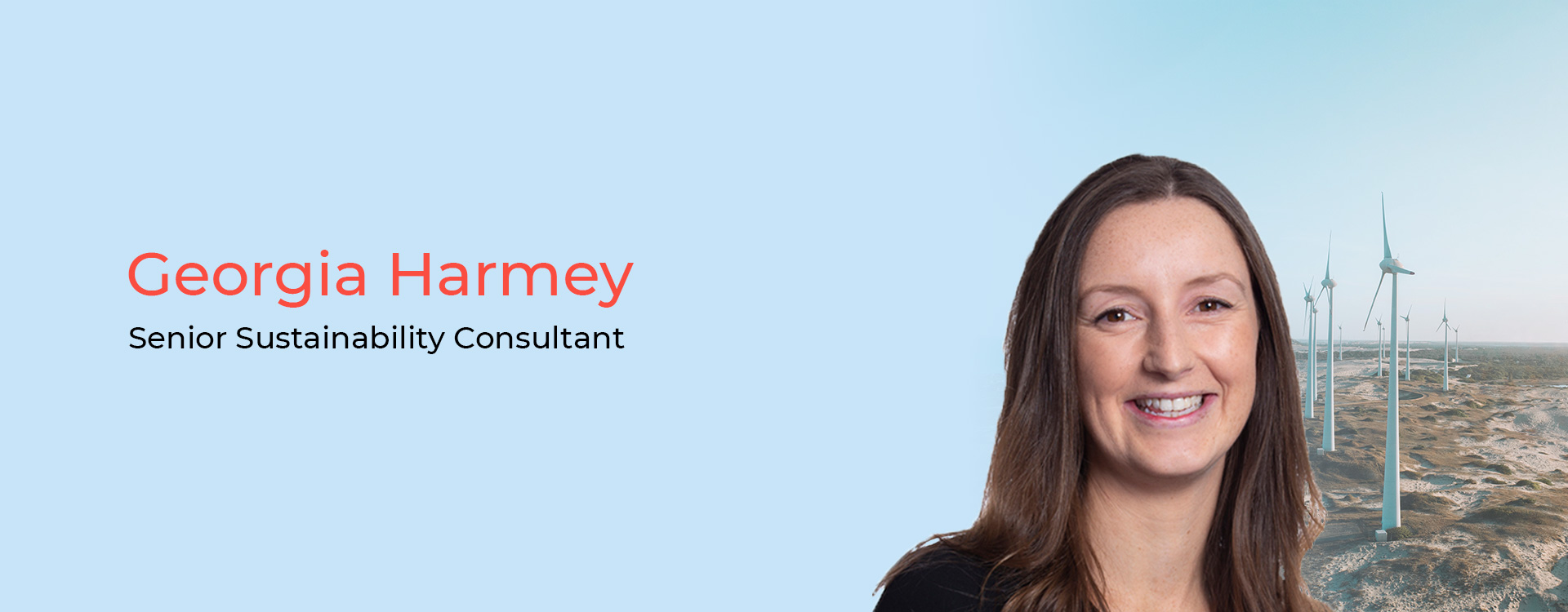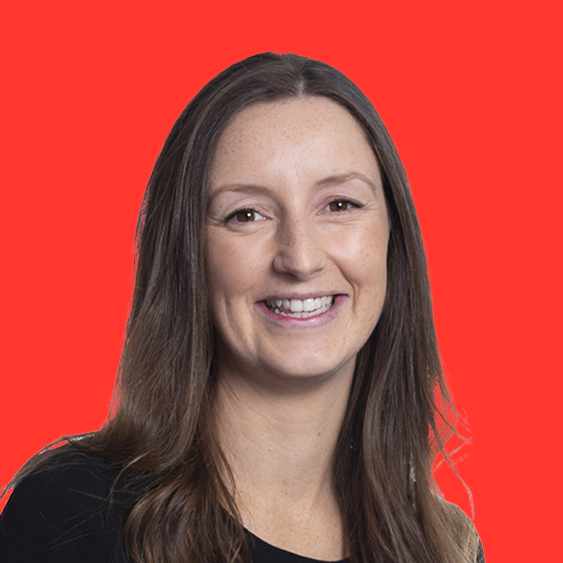
Georgia is a Senior Sustainability Consultant in WSP’s Property & Building’s team. She knew by the end of university that she wanted to go into Environmental Engineering, but it was through her first role in WSP’s Environmental Planning and Assessment Team that she discovered her interest in integrating sustainability into the early stages of the design process.
She now lends her expertise to various government projects across Australia, to deliver more sustainable infrastructure.
Starting out in Engineering
Combining her interest in maths and the natural and built environment, Engineering was a practical career choice for Georgia, and she liked the idea that she could make a positive contribution to society through her work.
“I was keen to work for a large engineering firm that was diverse in their service offering so that I could experience a variety of projects, work with multidisciplinary teams and broaden my knowledge of the engineering world.” Georgia says.
“Parsons Brinckerhoff (now WSP) had a great reputation and offered the diversity I was looking for.”
Georgia discovered WSP’s graduate program through a UNSW university event, where she met a WSP recruiter and was invited to an interview with the Environmental Planning and Assessment team.
“It was all a bit of a whirlwind and I remember being very nervous, but the interview went well.” She says.
“The transition to work from uni was strange but I do remember that I was pleasantly surprised how welcoming and supporting the people I worked with were. WSP has a great young professionals network so I attended lots of their events to meet other graduates.”
“Work can be so much more than your everyday project work, there are lots of internal and external programs, groups and industry bodies that you can join so I always encourage new graduates to get involved in different events that are happening within the company.
“Throughout my time at WSP I’ve been fortunate to work across a few different teams as well as work collaboratively with a wide variety of engineers, scientists, planners and consultants who have all influenced my professional and personal development.”
Finding a niche
In the Environmental Planning and Assessment team, Georgia mostly worked on a state significant road project, where she enjoyed the “close-knit project team culture”.
“This experience really expanded my knowledge about how projects are run, and the sheer volume and varied expertise required to deliver large infrastructure development projects.” She says.
After two and a half years in the role, Georgia decided she wanted to be involved more in embedding sustainability principles into the design process, so she transferred to WSP’s Sustainability team.
“Infrastructure Sustainability was a relatively new field at this time and I really enjoyed the challenge of learning something new and working with clients and multidisciplinary projects teams to rethink the way we traditionally plan, design and build our infrastructure.
“This has become my passion and although it can feel like an uphill battle at times, it’s really rewarding when you’ve contributed to achieving a more sustainable outcome or teach someone something about sustainability practices that they didn’t know.” She says.
Professional development with WSP Pathways
Georgia also took the opportunity to be involved in one of WSP’s Early Career Professional initiatives. Pathways (soon to be renamed WSP Emerging Professionals Network) is a program for early career professionals to network and build their skills through events, programs, and projects. As part of her participation in the program, Georgia was involved in a program where a group of young professionals were tasked with helping to solve an existing challenge within the business. Working with a small group, she investigated staff recruitment and retention, which also helped her to connect with people from across the business, and work on her interpersonal and presentation skills.
“I really enjoyed the opportunity to work on a project that was outside my core skillset and think about strategic challenges that face our business.” She says.
“I’ve constantly been challenged throughout my time at WSP and have often felt out of my depth, but I have learnt so much and am so grateful for my support network who believed in me and generously gave and continue to give me their time and wisdom to help with my professional development. This has all contributed to me being where I am today.”
Sustainability performance in wastewater
More recently, Georgia has been doing more strategic Sustainability Consulting work for government clients across Australia.
“It’s really great to see the momentum growing in this space.” She says.
One of Georgia’s favourite projects to work on was the upgrade of two wastewater treatment plants in Western Sydney, where she and her team assessed the sustainability performance of the project through a third-party verification scheme, a first for Sydney Water.
“My team and I quantified the project’s greenhouse gas, material and water footprint and assessed the benefits of innovative technologies that were adopted on the project that enhanced energy efficiency, reduced greenhouse gas emissions through biogas capture and energy recovery, and reductions in materials required to construct the project. Through this process we were able to demonstrate that the project would achieve a 43% reduction in energy use compared to a base case scenario and self-supply 67% of its electricity needs through biogas capture and energy recovery.”
“This was an eye opener for me, seeing the important role the wastewater sector can and will play in our transition to a decarbonised economy. Not only is the project removing greenhouse gases that would have otherwise been released to the atmosphere, but it is also capturing these and converting them to energy to power the plant, reducing their reliance on fossil fuels” She says.
A future opportunity was also identified by the project team to enhance energy recovery through co-digestion, which according to Georgia would involve “feeding organic waste such as food waste into the anaerobic digester (similar to a large compost bin) to generate more biogas that could be captured and used as either thermal energy or converted to electricity. This could allow for the two plants to become carbon neutral, therefore meeting Sydney Waters net zero target by 2030.”
A greener future
Working in sustainability, Georgia takes a positive outlook for the planet’s future, and has been involved in WSP’s Future Ready Program, which aims to challenge the way we design to consider future trends such as a changing climate, the rise of new technologies, resource shortages and societal changes.
“I have no doubts in whether it’s possible to stop climate change, however it’s a challenge that needs to be tackled collectively and with ambition and intent.” She says.
“I’m also excited to see the co-benefits that come out of this transition including improved air quality, reduction in land clearing and associated impacts to the biodiversity as we transition away from fossil fuels, and the rise of new technologies which likely lead to new discoveries and applications.
“Climate change, resource depletion and biodiversity loss are some of the biggest challenges facing society today. The engineering field will need to play a significant role in our transition to a decarbonised society and circular economy. I’m excited to play a proactive role in this journey and to work for a company who wants to be a leader in this space.
When asked about Australia’s part to play in a net-zero transition, Georgia said “Australia could and should definitely be more ambitious with our net-zero targets and road map to get us there, particularly at the federal government level. More is being done at the local and state government level and by the private sector which is hopeful, but we have a long way to go.”
Georgia’s Advice for Graduates
- be open minded, as you never know where your career might lead you
- say yes to every opportunity, you never know who you’ll meet and what you might learn
- get involved in work social events as well as programs and groups within your company and in the wider industry. It will broaden your horizons, contribute to your professional development and make your work life more enjoyable.
- Don’t be afraid to ask for what you want; whether that’s to work on a certain project, transfer to a different team, attend a training course or external event or ask for a pay rise. Your career is what you make it and more often than not you’ll find that your colleagues will support you.
- Take every experience as a learning opportunity, the good and the bad ones


